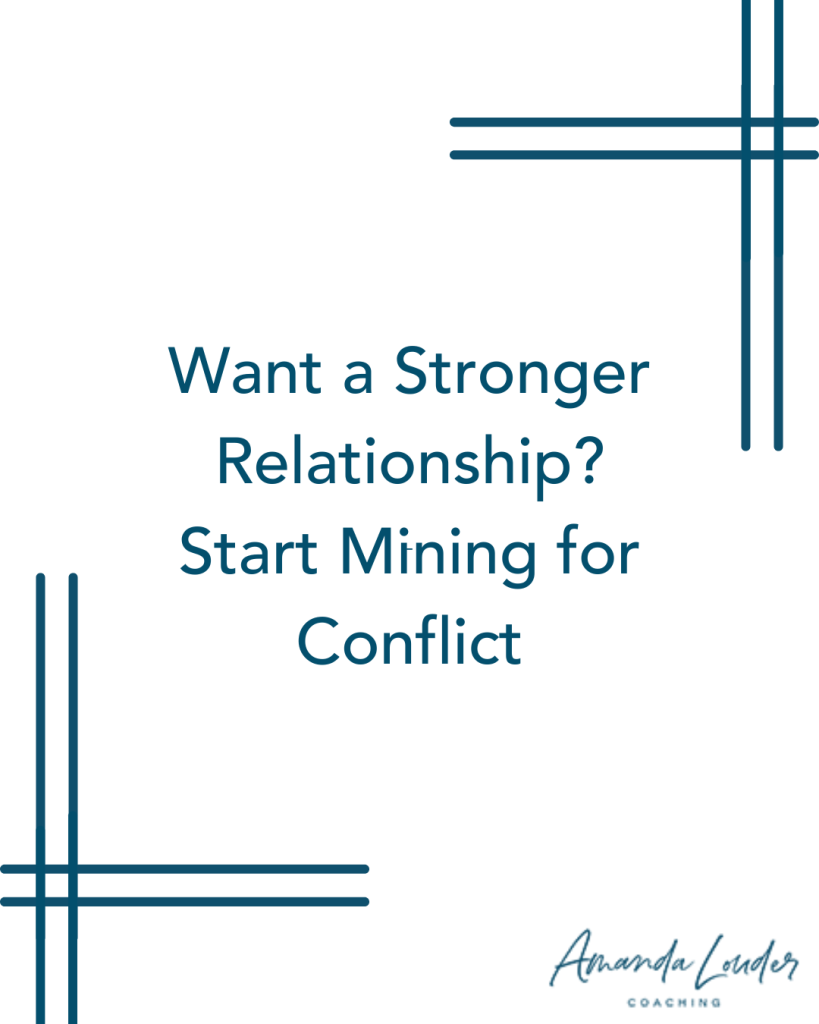
In this episode, I want to talk about something that may make you feel a little uncomfortable – mining for conflict. It is absolutely crucial for the health and intimacy of our relationships, but what is mining for conflict? It means actively seeking out and addressing underlying issues in a relationship. Finding these conflicts before they escalate into bigger issues and addressing the problems. Why rock the boat? Well, even if you’re ignoring them, the issues are still there. I’m going to give you real steps to take to not only find the conflicts, but to fix them as well.


Show Notes:
Follow Amanda on Facebook and Instagram.
Join Amanda’s Private Facebook Group.
Show Summary:
Hey everyone, welcome back. Today we’re going to talk about a topic that might feel a little uncomfortable but is absolutely crucial for the health and intimacy of our relationships: mining for conflict.
What does mining for conflict mean? Mining for conflict means actively seeking out and addressing underlying issues in a relationship that may not be immediately obvious or causing overt problems. It’s about digging beneath the surface to uncover and resolve potential sources of tension or dissatisfaction before they escalate into bigger conflicts.
Now, I know what you’re thinking – things are going well, so why would we want to rock the boat, right? It’s natural to want to avoid conflict, especially when everything seems peaceful. But here’s the thing: avoiding conflict doesn’t mean it’s not there. It just means we’re not addressing it. And when we don’t address conflict, we stop growing together as a couple and we have less intimacy.
So, let’s talk about why it’s important to mine for conflict and how we can do it in a way that strengthens our relationship rather than causing harm because the goal here is to improve communication, understanding, and intimacy within the relationship by ensuring that both partners feel heard and their concerns are addressed.
Why Mine for Conflict?
I want you to think of your relationship like a garden. If you only water the plants on the surface and never tend to the roots or pull out the weeds, eventually, the garden isn’t going to thrive. The same goes for our marriages. If we only focus on the surface and ignore the deeper issues, our relationship might look good for a while, but it won’t flourish in the long run.
When we’re willing to dig up those issues – the little annoyances, the misunderstandings, the unmet needs – we create an environment where true intimacy can grow. It’s about trusting your spouse enough to be vulnerable and having the safety to bring up concerns.
How to Mine for Conflict
So, how do we actually go about mining for conflict without causing a huge blow-up? Here are a few steps:
Take A Proactive Approach
Instead of waiting for conflicts to arise naturally, you take a proactive approach. This involves regular check-ins with your partner to discuss how each of you is feeling and whether there are any concerns that need to be addressed. Ask each other questions like, “Is there anything that’s been bothering you that we haven’t talked about?” or “How can I support you better?”
Creating a Safe Space
Establish an environment where both partners feel safe to express their thoughts and emotions without fear of judgment or retaliation. This safety is crucial for honest and open communication. And if you don’t have this currently or don’t know how to do it, consider getting some help.
Address Small Issues Early
Often, small annoyances or grievances can build up over time if not addressed. Mining for conflict means tackling these small issues early on, preventing them from growing into larger, more problematic conflicts.
Use “I” Statements
Frame your concerns from your own perspective. Instead of saying, “You never listen to me,” try, “I feel unheard when we talk about certain things.” This reduces defensiveness and opens up a more productive dialogue.
Listen Actively
When your partner brings up an issue, listen without interrupting. Validate their feelings and try to understand their perspective, even if you don’t agree with it.
Deepening Understanding
By exploring and discussing potential conflicts, partners can gain a deeper understanding of each other’s needs, desires, and perspectives. This process can lead to greater empathy and connection.
Building Trust and Intimacy
When partners feel confident that they can bring up issues without causing a major argument, it builds trust. This trust, in turn, fosters a deeper sense of intimacy and connection in the relationship.
Examples of Mining for Conflict
When mining for conflict, there are a few things that you can look for:
1 Reflective Conversations:
After a disagreement, have a reflective conversation about what triggered the conflict and how similar situations can be handled differently in the future.
Imagine you and your spouse had an argument about spending money. Maybe one of you feels the other is spending too much on non-essentials, while the other feels justified in their purchases. After the initial argument has cooled down, you sit down together for a reflective conversation.
You might start by saying, “I want to talk about our disagreement yesterday about spending money. I realize that we both have different views on what’s necessary and what’s not. Can we talk about what triggered our argument and how we can handle it better next time?”
In this conversation, you both take turns sharing your perspectives. Perhaps your spouse explains that their spending is a way to unwind after a stressful week, and you share that you’re worried about sticking to the budget. Together, you brainstorm ways to address both concerns, like setting a monthly allowance for discretionary spending that fits within your budget.
2 Seeking Feedback:
Invite your partner to give you feedback on areas where they feel improvement is needed. This could be about communication styles, household responsibilities, or emotional support.
Let’s say you notice that your partner seems stressed and overwhelmed with household chores. You decide to seek their feedback on how you can better support them. You might say, “I’ve noticed you’ve been really stressed lately with all the chores. Can we talk about how I can help more around the house? I want to make sure we’re sharing the responsibilities fairly.
Your partner might respond by saying they feel like they’re doing more than their fair share of the chores and that they’d appreciate it if you could take on specific tasks regularly. Maybe they suggest you handle the laundry and meal prep during the week. By seeking and acting on this feedback, you’re showing that you value their input and are committed to making the partnership more balanced and supportive.
3 Discussing Expectations:
Have open discussions about your expectations in various aspects of your life together, such as financial decisions, parenting styles, or career goals. Misaligned expectations can be a hidden source of conflict.
Consider a couple planning to have their first child. They might have different expectations about parenting roles and responsibilities. To avoid future conflicts, they decide to have an open discussion about their expectations.
One partner might say, “I think it’s important for us to discuss how we envision our roles as parents. I’d like us to share the responsibilities of childcare equally, but I’m also worried about how this will work with our current work schedules.”
The other partner might share their thoughts and concerns, perhaps expressing a desire to take on more childcare responsibilities but also acknowledging the challenges posed by their demanding job. Through this discussion, they can agree on a plan that works for both of them, such as staggering their work hours or arranging for childcare support when needed.
Let’s go through a couple more examples to see how this might look in real life.
Example 1: Quality Time
Perhaps you feel like you and your spouse haven’t been spending enough quality time together. You could start with, “I miss spending time with you like we used to. I know we’ve both been busy, but can we find some time each week to just be together and reconnect?”
Example 2: Sex Didn’t Go As Planned
Imagine you and your spouse recently had a sexual encounter that didn’t go as planned. Perhaps one of you felt uncomfortable or unsatisfied, leading to feelings of frustration or disappointment. After some time has passed, you decide to have a reflective conversation.
You might start by saying, “I’d like to talk about what happened the other night. I felt like we were a bit out of sync, and I want to understand what went wrong so we can improve our intimacy.”
During the conversation, you both share your perspectives. Your spouse might explain that they were feeling stressed and not fully present, which affected their experience. You might share that you felt unsure about their cues and how to respond. Together, you discuss ways to improve communication during intimacy, such as using verbal affirmations or non-verbal signals to ensure both partners feel connected and comfortable.
Example 3: Partner Less Interested In Sex
Let’s say you’ve noticed that your partner seems less interested in sex lately. You decide to seek their feedback to understand their feelings and how you can improve in this area. You might say, “I’ve noticed that we haven’t been as intimate lately, and I’m concerned. I want to understand what’s going on for you and if there is anything I can do to help. Can we talk about what you enjoy and what might make our intimate moments more fulfilling for you?”
Your partner might share that they’ve been feeling emotionally distant and need more non-sexual affection to feel connected. They might also express specific preferences or fantasies they’ve been hesitant to discuss. By seeking this feedback, you’re showing that you care about their satisfaction and are willing to make adjustments to improve your sexual relationship.
Example 4: Mismatched Libidos
Consider a couple where one partner has a higher libido than the other. To avoid misunderstandings and frustration, they decide to have an open discussion about their expectations regarding sexual frequency and types of intimacy.
One partner might start by saying, “I think it’s important for us to discuss our sexual relationship and make sure we’re both comfortable with our level of intimacy. I’ve been feeling like we’re not as intimate as I’d like, and I want to understand how you’re feeling.”
The other partner might express that they’ve been feeling pressured and would prefer more spontaneous, less scheduled intimacy. They might also share that they need more emotional connection outside of sex to feel ready for intimacy. Through this discussion, they can agree on a plan that respects both partners’ wants and desires, such as setting aside time for emotional bonding and allowing for more organic moments of intimacy.
The Benefits of Mining for Conflict
When you start mining for conflict, you might find that the initial conversations are tough. But over time, these discussions can lead to a deeper understanding of each other and a stronger, more intimate connection. You’re showing each other that your relationship is worth the effort and that you’re committed to growing together.
Remember, the goal isn’t to create conflict for conflict’s sake, but to address and resolve the underlying issues that might be hindering your relationship. It’s about creating a partnership where both people feel heard, valued, and understood and then working together to find a solution.
Conclusion
So, the next time things seem to be going smoothly, take a moment to check in with yourself and your partner. Are there any unresolved issues that need attention? Don’t be afraid to dig a little deeper. It’s through these conversations that we build the trust and intimacy that make our marriages truly special. And if you need help, my couples retreat and couples coaching are the perfect solution.
Remember, love is a journey, not a destination. Stay committed, stay passionate, and stay connected. Goodbye for now.




